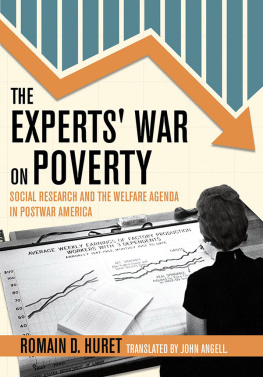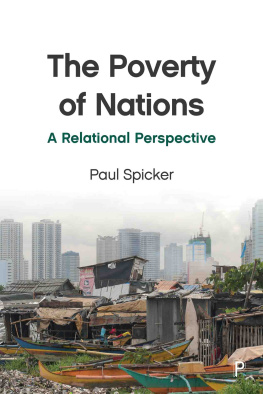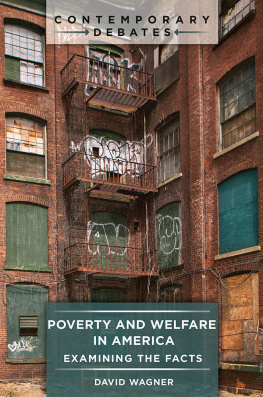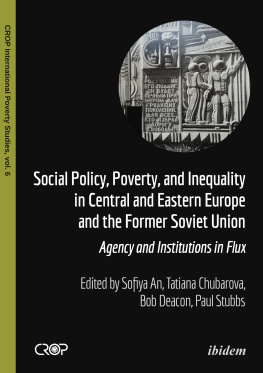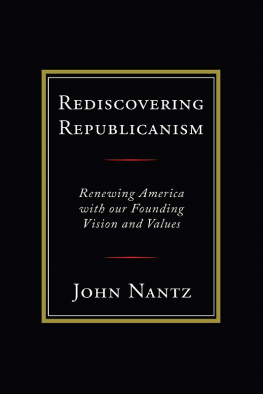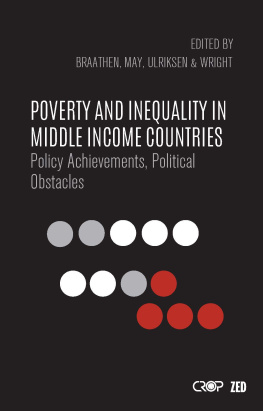Introduction
In 1983, at the same time that the conservative president Ronald Reagan was lamenting the presence of welfare queens on inner-city streets and of poverty traps inherited from idealistic 1960s reformers, the Wisconsin economist Robert Lampman was recalling the heady days in 1964 when President Lyndon Baines Johnson launched the War on Poverty. Persistent, grinding poverty in such a prosperous country came as a surprise to many Americans, who believed that such a plight had disappeared amid the postwar economic boom. Lampman candidly acknowledged that even economists had been blinded by the feverish economic growth and seemingly unlimited abundance of the 1950s: We never used the word poverty. We used other words. And so it was something of a shock to an economist to have the word poverty suddenly remerge. It had been consigned to the dustbin. Other words like Low-income population is one phrase for the poor. So it wasnt fashionable to talk about the poor or talk about the poverty problem.
Lampman, however, along with a team of like-minded men and women, eventually managed to make it fashionable to talk about poverty, and they nudged their fellow citizens into waging war on it. As an adviser to Johnson in the mid-1960s, Lampman proclaimed that by the year 1976, poverty would be a relic; two hundred years after the Declaration of Independence, the pursuit of happiness, at least on a material level, would represent something besides mere words for legions of urban and rural poor citizens.
A book by Michael Harrington, The Other America (1962), is often cited as an important turning point in popular histories. Harringtons sensitive portrayal of the poor, as well as the review of the book by Dwight McDonald in the New Yorker , ignited a political reaction that eventually culminated in the War on Poverty. But the individuals who did the hard work that eventually brought the problem of poverty into the national limelight have been largely unrecognized; they include Robert Lampman, Mollie Orshansky, Ida Craven Merriam, Herman Miller, Dorothy Brady, Helen Lamale, Selma Fine Goldsmith, Alvin Schorr, and many lesser-known bureaucrats and academics. The stories of these middle-class Americanseconomists, home economists, social workers, and statisticianshave remained in the background despite the fact that they were the driving force behind a vast postwar reform project to eradicate American poverty.
The rise of such a nationwide effort involved a conjunction of two elements: first, scientific evidence that, even in affluent, postwar America, rampant poverty persisted and, second, a functioning federal system capable of aspiring to eliminate this social and economic blight from the national landscape. In the postwar United States, achieving this conjunction was far from easy, both because prosperity was so pervasive and because there was powerful, widespread opposition to federal intervention in the social arena in the 1950s. In other words, the War on Poverty was not created out of thin air; nor was it a product of the zeitgeist. Instead, it was the result of an extended scientific, bureaucratic, and social process that drove a generation of middle-class bureaucrats and academics to extend and expand upon the idealistic, reformist zeal of the New Deal.
This book conjures these key figures back into existence. All of them were professionals with similar personal and professional backgrounds, and many had experienced poverty first-hand as children. They were all educated in American universities in the 1930s and 1940s and were influenced by intellectuals and philosophers for whom social justice was a moral, and often religious, imperative, among them Richard Tawney, Max Otto, William James, and Elizabeth Brandeis Raushenbush, to name just a few. They all supported Franklin Delano Roosevelts New Deal programs and were impressed by the massive growth of the federal government, especially during World War II. To some extent, though, historical scholarship has demonstrated that these same reformers are part of a lost generation who struggled to make themselves heard between the New Dealers of the 1930s and the New Leftists of the 1960s. They constitute a cohort of scholars and officials who belong to the shadowy 1950s that has so often been taken for granted by historians.
Our understanding of this community of poverty experts is obscured in part by the common portrayals of the decade as a period of consensus and complacency under the influence of McCarthyism, the Cold War, and domestic conservatism. The idea of a consensus, however, needs to be challenged. Postwar liberalism was defined by conflicting views and a growing awareness of the social and economic costs of the nations stark inequalities in the midst of rapid economic growth and rapidly rising mass consumption.
While liberals shared many white middle-class values, believing in the primacy of a male breadwinner, the importance of a classless society. and the assimilation of minorities, they disagreed about the ultimate shape that reforms should take as well as the means of achieving those ends. Some continued to believe that the reformist impulse of the 1930s had not ended with World War II, particularly at a time when conservative thought and activism were on the rise. As they questioned the postwar affluent society, poverty experts looked closely at the flaws of the welfare state created in the 1930s and 1940s.
As liberals very well knew, New Deal policies situated security at the center of American political and economic life. But this did not imply a welfare state that paid for social benefits by using the tax system to redistribute resources, because economic security would be exchanged for full-time employment. Both pensions and unemployment compensation were therefore to be paid for by employer and worker contributions. This also meant that New Dealers never regarded the benefits of means-tested programs as a basic right but saw them as a temporary form of charity for women and children living outside traditional breadwinner families. New Deal social policieswhether they doled out relief or conferred new social rightstargeted accidental poverty and were not implemented without heated debate. Historians have noted that a number of far-reaching ideas, from health care reform and equitable tax plans to full employment, were discussed beginning in the 1930s. FDRs famous Economic Bill of Rights speech captured this reforming spirit, but his ideas and policies had a hard time gaining political traction.
After the war, a generation of experts tried to transfer the security promised by prevailing politics to welfare programs after their research revealed a growing atmosphere of insecurity around the country. A citizens basic right to welfare lay at the heart of their scientific and political agendas. By promoting universal entitlement to government assistance, they were following in the footsteps of welfare officials who were committed to honoring FDRs promise that freedom from want was the right
There was consensus among them that the federal government possessed the necessary tools to solve the poverty dilemma. In the years immediately following the war against Germany and Japan, a victorious afterglow elevated the status of public experts, who became central figures in American public life. Their knowledge had played such a decisive role in winning the warone significant example being the Manhattan Projectthat it seemed reasonable to believe that they could help defeat social inequalities. Within the context of the Cold War, the country was fertile ground for this modernist faith in applied expertise, as the expanding federal bureaucracy gave rise to a proministrative government, a term used by historian Brian Balogh to describe the postwar alliance of academics and administrators. Once they concluded that their research provided the foundation for progressive policies and programs, poverty researchers who were invisible in the 1950s were catapulted into the role of public experts. Ending poverty was no longer a mere slogan; the concept had been transformed into a political proposal that, pending government support, could offer meaningful ways to implement experts dreams of eradicating poverty.

